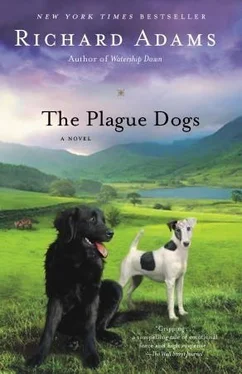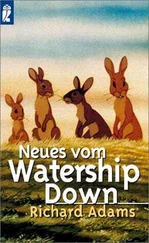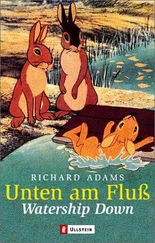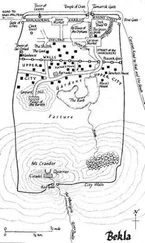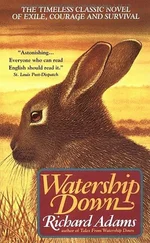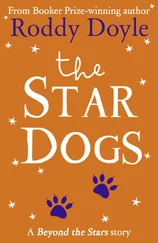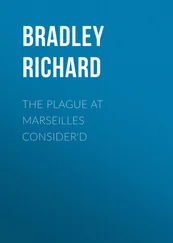Richard Adams - The Plague Dogs
Здесь есть возможность читать онлайн «Richard Adams - The Plague Dogs» весь текст электронной книги совершенно бесплатно (целиком полную версию без сокращений). В некоторых случаях можно слушать аудио, скачать через торрент в формате fb2 и присутствует краткое содержание. Город: New York, Год выпуска: 2007, ISBN: 2007, Издательство: Ballantine Books, Жанр: Природа и животные, Фэнтези, на английском языке. Описание произведения, (предисловие) а так же отзывы посетителей доступны на портале библиотеки ЛибКат.
- Название:The Plague Dogs
- Автор:
- Издательство:Ballantine Books
- Жанр:
- Год:2007
- Город:New York
- ISBN:978-0-345-49402-3
- Рейтинг книги:3 / 5. Голосов: 1
-
Избранное:Добавить в избранное
- Отзывы:
-
Ваша оценка:
- 60
- 1
- 2
- 3
- 4
- 5
The Plague Dogs: краткое содержание, описание и аннотация
Предлагаем к чтению аннотацию, описание, краткое содержание или предисловие (зависит от того, что написал сам автор книги «The Plague Dogs»). Если вы не нашли необходимую информацию о книге — напишите в комментариях, мы постараемся отыскать её.
, Richard Adams creates a lyrical and engrossing tale, a remarkable journey into the hearts and minds of two canine heroes, Snitter and Rowf, fugitives from the horrors of an animal research center who escape into the isolation—and terror—of the wilderness.
The Plague Dogs — читать онлайн бесплатно полную книгу (весь текст) целиком
Ниже представлен текст книги, разбитый по страницам. Система сохранения места последней прочитанной страницы, позволяет с удобством читать онлайн бесплатно книгу «The Plague Dogs», без необходимости каждый раз заново искать на чём Вы остановились. Поставьте закладку, и сможете в любой момент перейти на страницу, на которой закончили чтение.
Интервал:
Закладка:
“You smell of the metal water,” said the terrier. “You’ve been in the metal water again, so I tell, so I smell, well well.”
There was a long pause. At last Rowf said, “The water.”
“You smell like the water in my drinking-bowl. Is it like that? The bottom’s dirty, anyway. I can smell that, even if my head is done up in chicken-wire.”
“What?”
“My head’s done up in chicken-wire, I said. The whitecoats fastened it all round.”
“When did they? I can’t see it.”
“Oh, no,” replied the terrier, as though brushing aside some quite unreasonable objection, “of course you can’t see it!”
“The water,” said Rowf again.
“How did you get out? Do you drink it or does the sun dry it up or what?”
“I can’t remember,” answered Rowf. “Get out—” He dropped his head into the straw and began biting and licking at the pad of one fore-foot. After some time he said, “Get out—I never remember getting out. They must pull me out, I suppose. Why can’t you let me alone, Snitter?”
“Perhaps you’re not out at all. You’re drowned. We’re dead. We haven’t been born. There’s a mouse—a mouse that sings—I’m bitten to the brains and it never stops raining—not in this eye anyway.”
Rowf snarled at him. “Snitter, you’re mad! Of course I’m alive! Leave your face there if you don’t believe me—”
Snitter jerked his head back just in time.
“Yes, I’m mad, sure as a lorry, I’m terribly sorry. The road—where it happened—the road was black and white—that’s me, you know—”
He stopped as Rowf rolled over in the straw and lay once more as though exhausted.
“The water, not the water again,” muttered Rowf. “Not the water, not tomorrow—” He opened his eyes and leapt up as though stung, yelping, “The whitecoats! The whitecoats!”
This time there were no barks of protest, the cry being too frequent and common throughout the shed to attract remark.
Snitter returned to the wire and Rowf sat on his haunches and looked at him.
“When I lie down and shut my eyes the water comes suddenly. Then when I get up it isn’t there.”
“Like a rainbow,” answered Snitter. “They melt—I watched one once. My master threw a stick and I ran after it, along the river bank. That was—Oh, dear!” After a few moments he went on, “Why don’t you melt? They’d never be able to put you in the water then.”
Rowf growled.
“You’re always talking about your master. I never had a master, but I know what a dog’s business is as well as you do.”
“Rowf, listen, we must get across the road. Get across the road before—”
“A dog stands firm,” said Rowf sharply. “A dog never refuses whatever a man requires of him. That’s what a dog’s for. So if they say the water—if they say go in the water, I’ll—” He broke off, cowering. “I tell you, I can’t stand that water any more—”
“Where’s the gutter for that water, anyway?” asked Snitter. “That’s what I can’t understand. Bunged up with fallen leaves, I suppose. And the whippet’s leg—they must have eaten that. I asked him the other day in the yard, but he didn’t know. Said he was asleep when they took it away. Said he dreamt he was tied up to a stone wall and it fell on him.”
“Dogs are meant to do what men want—I can smell that, without a master. The men must have some reason, mustn’t they? It must do some sort of good. They must know best.”
“It’s a nuisance, but you can’t bury bones here,” said Snitter. “I’ve tried. The ground’s too hard. My head still aches. No wonder—there’s a garden in my ear, you know. I can hear the leaves rustling quite clearly.”
“Only I can’t bear the water again,” said Rowf, “and you can’t fight it, not water.” He began pacing up and down the wire. “The smell of the iron pond.”
“There’s always a chance they might lose it. They lost a sky full of clouds one day, you know. They were all there in the morning, but they were gone by the afternoon. Blown away—blown away like sheep’s wings.”
“Look, the wire’s loose here, along the bottom,” said Rowf suddenly. “If you come and put your nose under it, you can lift it up from your side.”
Snitter padded up to him on the other side of the wire. A length about eighteen inches long had pulled loose from the horizontal iron bar dividing the floor of the two pens.
“I must have done that,” he said, “chasing a cat—no. There used to be a cat once but they switched it off, I think.” He pushed at the wire for a few seconds, then raised his head with a cunning look. “Rowf, we’ll leave it till after the tobacco man’s been round. Otherwise he’ll only see me on your side and put me back, and that’ll be the end of that. Let it alone, old Rowf.”
“You’re sharp. Listen, Snitter, is that the tobacco man outside now?”
“I’m mad as a gutter in a thunderstorm,” said Snitter. “I fall and fall—my head falls and I fall after it. Can you smell the falling leaves? It’s going to rain. Remember rain?”
As the latch clicked on the green-painted door half-way down the block, Rowf went back to his kennel and lay still as frost. Most of the other dogs, however, reacted vigorously and volubly. From all over the shed sounded scurrying and yelps, quick whines of excitement and resonant, harp-like rataplans of claws along wire mesh. Snitter leapt three or four times in the air and ran towards the door of his pen, jaws full of slobbering tongue and breath steaming in the chilly air.
The green door, which opened inwards, tended to stick against the jamb. A shoulder-heave from outside, which succeeded only in bending the top of the door inwards, was followed by the clank of a pail being put down and then by two heavy, rubbery kicks just above the threshold. The door burst open and instantly every dog in the shed was aware of the night breeze filtered through a pungent reek of burning shag. In the doorway stood the tobacco man himself, pipe in mouth and a pail in each hand, odorous of tobacco as a pine tree of resin, redolent from cloth cap to gum-boots. The yapping increased, the movement, noise and tension throughout the block mounting in contrast with the silent deliberation with which the tobacco man carried in the two pails, set them down, returned for two more and then for a final two. This done, he went back to close the door and then, standing in the middle of the six, took out his matches, struck a light, cupped his hands round his pipe and re-lit it very thoroughly and carefully, taking no notice whatever of the barking and jumping around him.
Snitter, muttering “That pipe hasn’t got a chance—not a chance,” put his front paws on the wire and cocked his head sharply to the right in order to watch the tobacco man as he fetched a five-gallon watering-can from a corner and, with a slow, unhurried clumping of gum-boots, carried it over to the tap, placed it underneath, turned the tap on and stood beside it while it filled.
Old Tyson had once been a sailor, then a shepherd, then for several years a road man employed by the county council; but had taken the option of a job with Animal Research because, as he said, there were less weather wi’t and aall in’t woon plaace like. He was well regarded and indeed valued by the Director and senior staff, being reasonably respectful, if somewhat dour, in his behaviour, reliable, generally conscientious and no more given to sentimentality about animals than any other Lakelander. Also, being well on in middle age, he was steady and regular and not prone to ailments or to odd days off on account of family problems—which in his case had all been solved (or not solved) long ago. He understood dogs well enough, his attitude towards them being equally valid for the purposes of A.R.S.E. or for those of a Lakeland hill-farm—namely, that they were pieces of technological equipment which one needed to know how to maintain and use properly. Tourists’ and holiday-makers’ dogs annoyed him, being useless for any practical purpose, frequently disobedient and a potential danger to sheep.
Читать дальшеИнтервал:
Закладка:
Похожие книги на «The Plague Dogs»
Представляем Вашему вниманию похожие книги на «The Plague Dogs» списком для выбора. Мы отобрали схожую по названию и смыслу литературу в надежде предоставить читателям больше вариантов отыскать новые, интересные, ещё непрочитанные произведения.
Обсуждение, отзывы о книге «The Plague Dogs» и просто собственные мнения читателей. Оставьте ваши комментарии, напишите, что Вы думаете о произведении, его смысле или главных героях. Укажите что конкретно понравилось, а что нет, и почему Вы так считаете.
